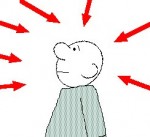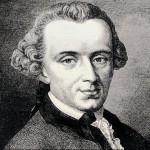Through his Transcendental Deduction Kant sought to respond to several questions raised within his context within the Modern period.
 First, Descartes had radically deconstructed perceived reality in an effort to mindfully choose exactly what he would believe rather than simply taking on assumptions passed to him by the accident of his birth in a particular place and culture. Descartes found that he could doubt every proposition except his famous cogito sum. To contradict the existence of the thinking I would be absurd.
First, Descartes had radically deconstructed perceived reality in an effort to mindfully choose exactly what he would believe rather than simply taking on assumptions passed to him by the accident of his birth in a particular place and culture. Descartes found that he could doubt every proposition except his famous cogito sum. To contradict the existence of the thinking I would be absurd.
 However, in response to the cogito, Hume offered a further critique. As an empiricist, Hume's own philosophical arguments were based on experience. As such, we could not know much, if anything, about objects outside of immediate sensory experience.
However, in response to the cogito, Hume offered a further critique. As an empiricist, Hume's own philosophical arguments were based on experience. As such, we could not know much, if anything, about objects outside of immediate sensory experience.
Further, because there is no sensation that supports a connection between various perceptions, Hume argued that we cannot infer identity based on similarity between individual sensations. Such radical skepticism threw the world into doubt.
In addition to skeptical empiricism, Leibniz's monadology proposed that understanding contains certain innate principles that are intuitively known to be true which can be used to derive a complete description of the world. Individual points of view can be fitted into an overall system that provides an absolute view of the way things are (as opposed to how they might seem). Taken to its full conclusion, Leibniz's system leads to a deterministic universe bereft of free will.
 In the Transcendental Deduction, Kant proposes a theory of cognition that provides more certainty than empirical skepticism, while leaving room for free will which Leibniz had rendered impossible.
In the Transcendental Deduction, Kant proposes a theory of cognition that provides more certainty than empirical skepticism, while leaving room for free will which Leibniz had rendered impossible.
Before the TD begins, Kant has already argued in the Transcendental Aesthetic that the concepts of space and time are necessary to thinking of any object. However, coordinates in space and time at most can point to a particular object here and now. Such "intuitions" as Kant referred to them are insufficient to full cognition since there is no interpretative framework that holds various this/here/now moments together in a logical narrative[1] (A97). Kant proposes a "synthesis of apprehension" that runs through various moments, shaping them into a coherent narrative in time (A99).
In order for a person to do anything meaningful with this sequence of sensory inputs, it must be possible to reproduce the previous moments of apperception in her imagination in a logically ordered sequence from one point in time to another. Kant refers to this as the "synthesis of reproduction" without which individual moments would simply be lost (A102).
Finally, Kant suggests that this reimagined sequence held in the mind must be recognizable as "mine," or related to a single person's experience as part of a single narrative. Without this continuous thread of identification with one person to hold the events together from a single viewpoint, it would again be impossible to make sense of a single cohesive narrative. This Kant refers to as the "synthesis of recognition" (A103) and the "pure, original, unchanging consciousness" of a single self as the "transcendental apperception" (A107).
What is still missing from this account is how we actually make sense of anything that we have perceived. The meat of the Transcendental Deduction then suggests that once we have established a sequence of events that we can contemporaneously hold in our minds that are necessarily related to one another and can be identified from a common point of view (mine), the experiences still do not contain the necessary tools for making sense of them. Thus Kant suggests that there must be certain a priori categories within our consciousness that allow us to make sense of our intuited perceptions (A111). The categories allow us to apply rules to make sense of our experiences.
With this formulation, Kant challenges empiricist assumptions that we can directly observe our experiences, pointing out that we can directly observe only our own stream of consciousness. How we experience objects is actually dependent on the a priori categories that shape our consciousness. Further, Kant addresses Hume's skepticism regarding the similarity and identity of the thinking subject by suggesting that we must work from the idea of a unified subject in order for our sense experience to be truly ours and integrated.
Finally, Kant breaks the Leibnizian hold over free will by proposing that the categories which shape our thoughts give rise to understanding for us (A126); however, they say absolutely nothing about the objects in themselves. Kant directly addresses the freedom of objects in themselves from a strictly mechanistic creation by pointing out that causality only extends to our perception and cognition of objects, but not objects as they are in themselves in the B version of the deduction (Bxxvii-Bxxviii).
[1] Citations in this essay refer to Immanuel Kant, Paul Guyer, and Allen W. Wood, Critique of Pure Reason, The Cambridge edition of the works of Immanuel Kant (Cambridge ; New York: Cambridge University Press, 1998).
Photo credits: Brandon Wraith
What is Kant arguing in the Transcendental Deduction? How is this meant to respond to characteristically “modern” problems?



